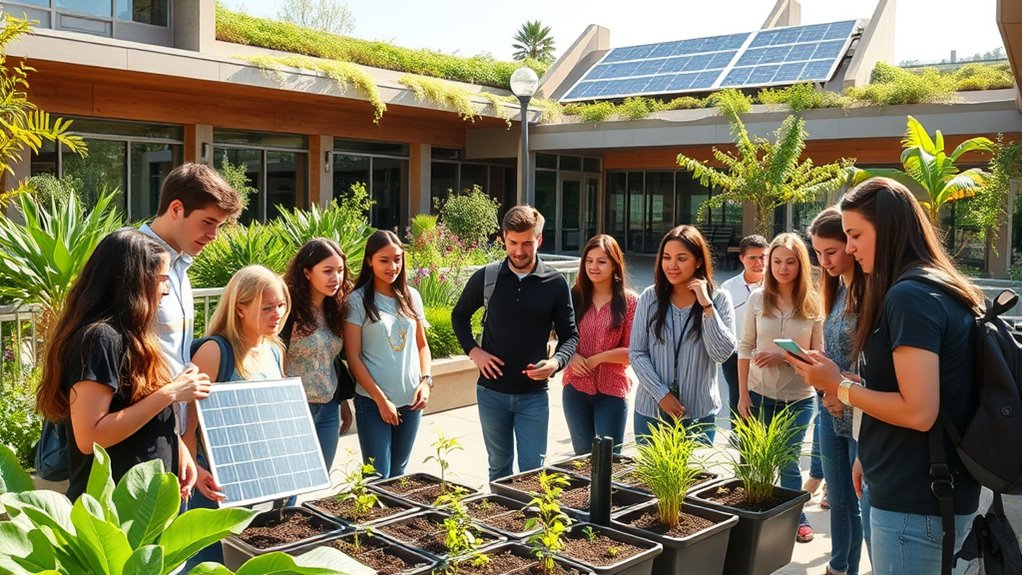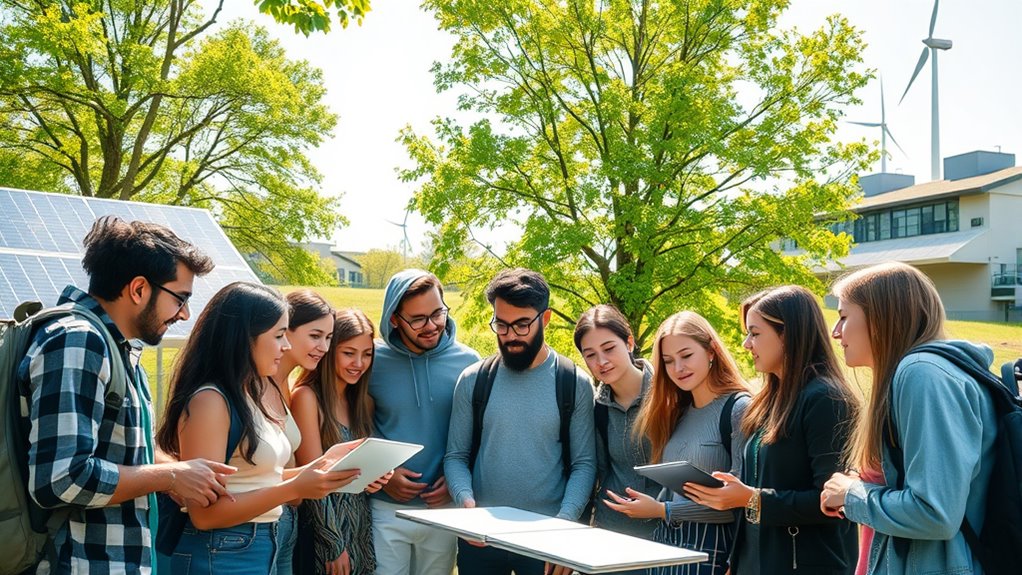To prepare students for green careers, higher education should incorporate sustainability concepts into curricula, focusing on renewable energy technologies like solar, wind, and bioenergy. Students benefit from hands-on, project-based learning and industry partnerships that foster practical skills. Emphasizing critical thinking, innovation, and understanding of policies helps build a future-ready workforce. If you want to learn how these approaches can transform education and empower students, keep exploring further.
Key Takeaways
- Integrate renewable energy concepts and practical, project-based learning into curricula to develop relevant technical skills.
- Foster critical thinking and innovative problem-solving focused on sustainable solutions and environmental impacts.
- Build industry partnerships to provide experiential learning, internships, and awareness of real-world renewable energy challenges.
- Educate students on policy, economic factors, and social equity to prepare them for industry and community engagement.
- Encourage continuous learning and adaptability to keep students current with technological advances and green workforce demands.

As the demand for sustainable solutions grows, preparing students for green careers becomes more essential than ever. Higher education institutions have a crucial role in shaping the next generation of professionals who will lead the shift to a more sustainable future. This change involves integrating key concepts like renewable energy and sustainable innovation into curricula, making sure students are equipped with the skills needed to thrive in a rapidly evolving job market focused on environmental responsibility. It’s not just about teaching theory; it’s about providing practical, hands-on experience that connects students directly to real-world challenges. By emphasizing renewable energy technologies—such as solar, wind, and bioenergy—you help students understand the mechanics behind these systems and their potential to replace fossil fuels. This knowledge isn’t just academic; it’s essential for developing innovative solutions that make energy production cleaner and more sustainable. Sustainable innovation, in this sense, refers to creative approaches that reduce environmental impacts while maintaining economic viability. You want students to think critically about how they can contribute to developing new materials, design efficient energy systems, and improve existing technologies. This encourages a mindset of continuous improvement, where innovation is driven by the need for ecological balance. Incorporating interdisciplinary coursework, project-based learning, and industry partnerships allows students to see how renewable energy projects come to life—from initial design to deployment. This kind of experiential learning boosts confidence and prepares them for careers in fields like clean energy engineering, environmental consulting, and policy development. It’s also essential to foster an understanding of the broader impacts of renewable energy and sustainable innovation, such as social equity, economic growth, and community resilience. You want students to grasp that green careers aren’t just about technical skills—they also involve a commitment to ethical practices and sustainable development goals. Staying current with technological advances and policy changes that influence renewable energy markets is crucial for cultivating a future-ready workforce. This proactive approach guarantees they remain adaptable and innovative in their future roles. Additionally, understanding the latest advancements in solar panel technology can significantly enhance students’ ability to develop efficient and eco-friendly energy systems. Exploring new energy storage solutions is also critical for addressing intermittency issues and ensuring reliable power supply. Familiarity with emerging smart grid infrastructure can further improve the integration and management of renewable resources. Keeping abreast of renewable energy policies is vital for navigating the regulatory landscape and advocating for sustainable initiatives. Developing a comprehensive understanding of renewable energy economics can help students evaluate the financial viability of projects and make informed decisions. Preparing students for green careers isn’t just an academic exercise; it’s a strategic investment in our planet’s future. By fostering expertise in renewable energy and sustainable innovation, you empower students to become change-makers—those who will develop, implement, and advocate for sustainable solutions that benefit society for generations to come. Ultimately, your role is to inspire confidence, equip with relevant skills, and cultivate a mindset of continuous learning and responsibility in every student stepping into the green workforce.
Frequently Asked Questions
How Can Students Gain Practical Experience in Green Technologies?
To gain practical experience in green technologies, you should participate in internship programs that offer real-world exposure and hands-on workshops to develop your skills. These opportunities allow you to work directly with sustainable projects, learn from industry experts, and apply your knowledge in practical settings. By actively engaging in internships and workshops, you’ll build valuable experience, making you more competitive for green careers in the future.
What Industries Are Currently Creating the Most Green Job Opportunities?
When it comes to green jobs, the greenest pastures are in renewable energy and sustainable agriculture. These industries are on fire, creating opportunities for those ready to roll up their sleeves. You’ll find roles in solar and wind power, energy efficiency, and eco-friendly farming practices. They’re not just buzzwords—they’re shaping the future, proving that you can make a real difference while building a stable career.
How Do Sustainability Programs Vary Globally Across Universities?
You’ll notice that sustainability programs vary globally due to cultural influences and policy differences. In some regions, universities prioritize renewable energy and environmental science, while others emphasize social sustainability and community engagement. Policies shape funding and curriculum focus, leading to diverse approaches. By understanding these differences, you can better appreciate how local values and government initiatives influence sustainability education worldwide, preparing you for careers that address global environmental challenges.
What Skills Are Most Valued in the Green Workforce?
In the green workforce, you’ll find that green skills and eco competencies are highly valued. Employers seek individuals who understand sustainable practices, renewable energy, and environmental policies. Your ability to innovate eco-friendly solutions, analyze environmental data, and apply sustainable technologies sets you apart. Developing these skills makes you adaptable, enhances your employability, and positions you as a key player in advancing sustainability initiatives across industries.
How Can Students Finance Their Education in Sustainability Fields?
Securing sustainable studies starts with smart strategies. You can explore scholarship opportunities tailored to sustainability fields, helping ease the financial burden. Additionally, consider student loan options that offer flexible repayment plans aligned with green careers. By researching and applying for these financial aids early, you pave a practical path toward your passion for sustainability, ensuring your education is accessible without sacrificing your future.
Conclusion
By preparing students for green careers today, you’re not just shaping their futures—you’re unexpectedly shaping the planet’s tomorrow. When students embrace sustainability, they often find opportunities and passions they never anticipated, turning their education into a catalyst for change. It’s a coincidence worth celebrating: your efforts in higher education could be the very reason someone transforms a career into a lifelong mission for the environment. Together, you’re creating a ripple effect of positive change.









